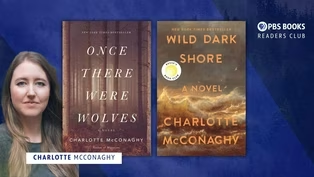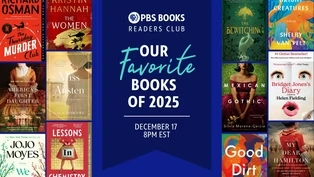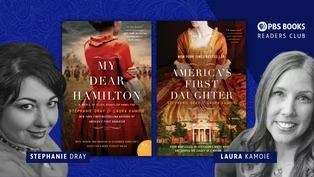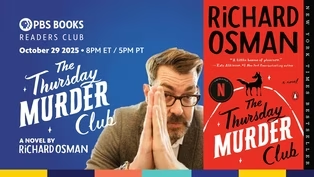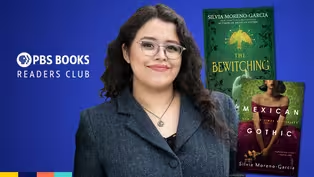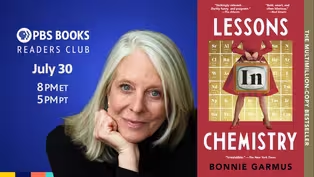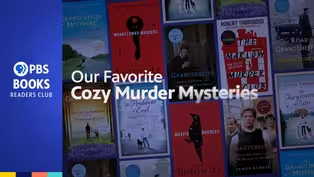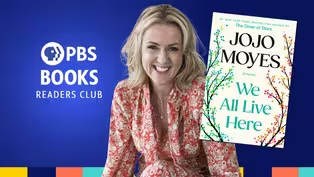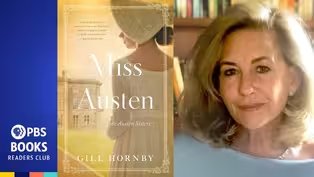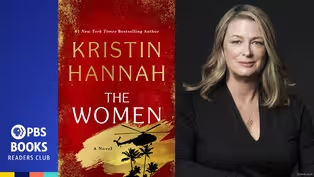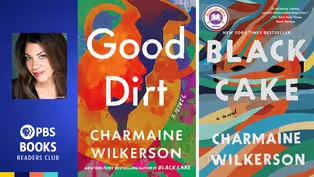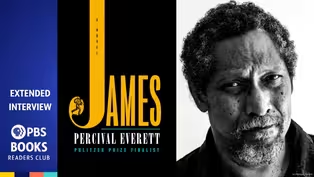
Readers Club | Percival Everett
Season 2024 Episode 31 | 45m 36sVideo has Closed Captions
Eminent author Percival Everett shares his vision behind his remarkable novel "James".
In "James", Everett places Jim, the enslaved character in "The Adventures of Huckleberry Finn" by Mark Twain, front and center in this powerful narrative, giving voice to his untold story. Brimming with humor while delivering biting observations on themes of race and freedom, James is a provocative and unforgettable page turner that will forever alter our perception of American literature.
Problems playing video? | Closed Captioning Feedback
Problems playing video? | Closed Captioning Feedback

Readers Club | Percival Everett
Season 2024 Episode 31 | 45m 36sVideo has Closed Captions
In "James", Everett places Jim, the enslaved character in "The Adventures of Huckleberry Finn" by Mark Twain, front and center in this powerful narrative, giving voice to his untold story. Brimming with humor while delivering biting observations on themes of race and freedom, James is a provocative and unforgettable page turner that will forever alter our perception of American literature.
Problems playing video? | Closed Captioning Feedback
How to Watch PBS Books
PBS Books is available to stream on pbs.org and the free PBS App, available on iPhone, Apple TV, Android TV, Android smartphones, Amazon Fire TV, Amazon Fire Tablet, Roku, Samsung Smart TV, and Vizio.
Providing Support for PBS.org
Learn Moreabout PBS online sponsorshipMore from This Collection
The PBS Books Readers Club is a monthly digital-first series that brings its members into conversations behind the stories of your favorite books & shows. You can watch the online on the PBS App, with extended interviews available for PBS members on PBS Passport.
Readers Club | Ep 301: Charlotte McConaghy | Once There Were Wolves
Video has Closed Captions
PBS Books Readers Club hosts author Charlotte McConaghy to discuss her novel Once There Were Wolves. (58m 55s)
Readers Club | Ep. 212: Our Favorite Books of 2025
Video has Closed Captions
PBS Books Readers Club celebrates the wrap of its second season with a highlight of 2025 (47m 55s)
Readers Club | Ep. 211: America's First Daughter | Stephanie Dray & Laura Kamoie
Video has Closed Captions
PBS Books Readers Club welcomes co-authors Stephanie Dray and Laura Kamoie (1h 1m 45s)
Wed Oct 29 2025 | Readers Club | Ep. 210: Richard Osman | Thursday Murder Club
Video has Closed Captions
PBS Books Readers Club welcomes celebrity writer Richard Osman to discuss his best-selling novel (52m 44s)
Readers Club | Ep. 209: Silvia Moreno-Garcia | The Bewitching and Mexican Gothic
Video has Closed Captions
PBS Books Readers Club welcomes award winning author Silvia Moreno-Garcia to discuss her new book. (52m 42s)
Readers Club | Ep. 208: Helen Fielding | Bridget Jones's Diary
Video has Closed Captions
PBS Books Readers Club welcomes beloved British author Helen Fielding to discuss her iconic novel (59m 30s)
Readers Club | Ep. 207: Lessons in Chemistry | Bonnie Garmus
Video has Closed Captions
PBS Books Readers Club welcomes international best-selling author Bonnie Garmus to discuss her novel (49m 3s)
Readers Club | Ep. 206: Our Favorite Cozy Murder Mysteries
Video has Closed Captions
PBS Books Readers Club hosts a special event sharing Our Favorite Cozy Murder Mysteries (52m 32s)
Readers Club | Ep. 205: We All Live Here | Jojo Moyes
Video has Closed Captions
PBS Books Readers Club welcomes international & New York Times best-selling author Jojo Moyes (57m 37s)
Readers Club | Ep. 204: Miss Austen | Gill Hornby
Video has Closed Captions
PBS Books Readers Club welcomes international best-selling author Gill Hornby to discuss her novel (51m 18s)
Readers Club | Ep. 203: The Women by Kristin Hannah
Video has Closed Captions
PBS Books Readers Club welcomes international best-selling author, Kristin Hannah to discuss novel. (53m 29s)
PBS Books Readers Club | Ep. 202: Good Dirt & Black Cake | Charmaine Wilkerson
Video has Closed Captions
PBS Books Readers Club is delighted to welcome critically acclaimed author Charmaine Wilkerson (55m 29s)
Providing Support for PBS.org
Learn Moreabout PBS online sponsorship(upbeat music) - I didn't write this as a corrective to Twain's novel.
I'm not calling Twain out and laying you around.
His mission was a different one.
He was telling the story of a adolescent white boy, and I'm telling the story of a full grown Black man who has a family and a life.
(upbeat music) - Well, hi, and welcome to the PBS Books Readers Club.
- Today we'll be joined by esteemed author Percival Everett.
I can't wait to discuss his New York Times bestselling book, "James."
- This book is an insightful re-imagining of Mark Twain's "The Adventures of Huckleberry Finn" told from the perspective of Jim, who we now know as James, as he flees slavery alongside Huck on their journey on the Mississippi.
It is beyond words amazing.
- Yeah, we'll also reveal our pick for next month's read.
So stick around for that.
- Hi, I'm Fred Nahhat.
Here with Lauren Smith.
Heather-Marie Montilla is of course our resident librarian and the PBS Book's National Director and Princess Weeks, award-winning video SES and author who brings her masters in literary theory to level up our little book club.
Princess, thank you for that.
- Thank you.
- We need you.
We need you for that on this one.
- This one was, I really felt like I got to put all those grinds together.
(all laughs) - But of course you are the most important person in this book club.
As we discussed "James" today, please, please share your thoughts with us and the other book clubbers in the comments, and join the PBS Books Readers Club Facebook group to find and share book recommendations and discuss your favorite reads anytime.
And please make sure to share this event.
Friends, do not let friends miss out on great books.
So let's talk about this incredible book.
Princess, what were your thoughts?
- Well, I already knew I was gonna like this.
I like recommended it.
I was pushing for it, but it just was beyond anything I could have imagined.
I've been familiar with Percival Everett's previous work, but this just feels like so many different things.
The way it discusses American literature, the way it talks about the realities of enslaved people, the way it brings humanity to a character that's so often dehumanized.
And it's not even super long, but every bit of it just feels so delicious.
It was a delicious read, I think is how I would put it.
- So I was looking forward to reading this book, but I will say I've always, if I was to recall my experience reading "The Adventures of Huckleberry Finn", the fact the n word was present in that book for me as a young person was disturbing and not something I wanted to go back to.
And so at first when I opened this book, I had some nervousness about this book, about encountering and going on that adventure.
But it was amazing.
It was incredible.
It was more than I could have ever imagined.
And I'm so glad we read it and I'm so glad you all read it.
- Thank you for recommending it, Princess.
We're really glad for that.
- Thank you.
- Thank you.
- Well, I have to say the whole concept, the reimagining around Huckleberry Finn genius of course, but also the gamesmanship around language slips and certainly a tragic and fraught period.
But in the end, James kind of cunning and kind of meta.
- I think that if I had read this book back when we studied Twain in high school, I would've loved to read this book right alongside "The Adventures of Huckleberry Finn" because I think it helps you understand the issues with, and also the good things about Twain's original novel.
And I can't wait to dive into that a little bit more.
I can't believe we get to talk to him.
- I'm so excited.
- I'm so excited.
- Absolutely.
- What is a great get so much to discuss with Percival Everett.
He's standing by to join us in just a moment and we want to invite you to join the PBS Books Readers Club too.
There are many ways to connect, including our e-newsletter.
You'll find exclusive author interviews, book recommendations, and more.
Visit pbsooks.org/subscribe and be sure to follow PBS Books on Facebook and Instagram and fill up your feed with great books and great authors.
- And if you really love this PBS Book Club, I hope you'll take a moment to show your support.
PBS stations rely on donations from folks like you and me.
So if you'd like to see more of the PBS Books Readers Club, here's a great way to help us keep it going.
If you're watching on Facebook or YouTube, just click the link in the comments or the description, or you can visit pbsbooks.org/donate.
You'll be taken right to your local PBS stations giving webpage where you can find some PBS Books mug is our thanks for supporting this program.
One of those gifts is an ebook download of "James" or any of our PBS Books' features for your phone, tablet, or e-reader.
After you make your donation, you'll receive an email with a link and a special code to download one of our featured books.
- Or you can get one of our official PBS Books mugs, just $5 a month.
We'll get you the PBS Books mug and makes you a member of your local PBS station giving you access to all the amazing shows and passport, including the extended edition of this interview with Percival Everett.
- Yeah, everybody has been asking for these mugs, so we had to bring 'em your way look at.
My weekend is booked.
How cute is that?
Perfect for cozying up with your next great read.
- So perfect.
So if you wanna see the PBS Books Readers Club, we gotta hear from you.
Just click the link in the description or visit pbsbooks.org/donate.
We will send you a set of the official PBS Book stickers too, along with your ebook or mug.
Again, donations support your local PBS station and it'll help us keep this book club going for another month.
And now let us welcome in Percival Everett.
Mr. Everett, welcome to the PBS Books Readers Club.
- Nahhat thank you for having me.
- And thank you so much for this incredible book, "James."
We all just loved reading it.
Tell us all about why you wrote this book and how it came to be.
- Well, I wish I could tell you that I had a brain desire for many years to write this, but I didn't.
About three years ago I was playing tennis and I made a really poor shot.
And after I watched the ball sail away, I thought, I wonder if anyone has ever ridden this out from the point of view of Jim.
And it's also explained to me why I hit the ball so poorly.
(ladies laughing) - I wish I had thoughts like that when I was playing tennis.
- Yes, of course.
- Yeah.
- So I went home and I couldn't find an example of the story of Huckleberry Finn through Jim's eyes.
So I just decided to do it and it happened.
- We're so glad you did.
- Yeah, certainly are.
- When did you first read "Adventures of Huckleberry Finn" as a child?
- I was eight or nine.
And I read an abridged version, and I don't know what made it abridged.
It was, of course, didn't know at the time that it was abridged.
Well, it might have actually said abridged version on the cover.
But as an 8-year-old, I didn't know what that meant.
And as a teenager I reread it and of course it's a problematic novel for anyone and to read, but certainly for a Black teenager to read it.
Even then I could see the importance of novel as Huck represents this adolescent America, not just an adolescent boy moving through the American landscape.
Dealing with the future of the American experience that becomes the most defining feature of America which is race.
- Yeah.
- Absolutely.
- Some of the events in your book line up with Twain's "Adventures of Huckleberry Finn."
Of course, others modified a bit.
There are some scenes from Twain's book that are omitted entirely.
How did you decide when to deviate?
- Well, I had to divorce myself from the text, and in order to do that, I read "The Adventures of Huckleberry Finn" 15 times.
- Wow.
- Gee.
- I would get to the, and just start again until I was really about the fourth time through, I was really sick of Twain's and Finn.
But I needed to inhabit that world without owing any loyalty to the text.
And so I felt I'd done that.
And then I never looked back at it.
And any of the events that are faithful to Twain's novel are simply because they're part of my understanding of that world.
Some things fell away and some things remained.
Also in the novel, there are places where Huck and Jim are separated, and we don't know what's going on with Jim and Huck Finn.
And in my novel, I don't know what's going on with Huck Finn.
He's not with Jim.
- That's so fascinating.
I've read Huck Finn a few times in grad school, and I think the relationship between Huck and Jim is so interesting 'cause it's one of the rare examples of like, empathy across those racial lines.
And so to build off your previous question, when you were crafting James's point of view, how did that redefine the character of Huck Finn from developing it from that perspective in your mind?
- The depiction of the character Jim in Huck Finn is terribly wanting.
There's no agency there.
Jim is just portrayed as a simple-minded childlike figure moving through this story subject to bouts of superstition and easily duped by even the youngest of the characters.
And not only is that unfair to this character, but I would imagine completely untrue to the care.
And so when I started telling the story, I accepted the fact that I wasn't presenting Jim to give him agency.
He already possessed it.
I was trying to give him an expression of that agency.
One of the things that I have to say is I didn't write this as a corrective to Twain's novel.
I'm not calling Twain out and saying you were wrong.
His mission was a different one.
He was telling the story of a adolescent white boy.
And I'm telling the story of a full grown Black man who has a family and a life.
- One thing that really stuck with me at one point in your book, Jim is noting Huck's perception of their events as being an adventure.
While James, of course is constantly aware of the threat to his life, the lives of his family.
Talk to us a little bit about this shift in perspective and why it was so important for you to capture.
- Well, you know what?
You might call that a very early example of white privilege.
Huck has the privilege of viewing his life out in the world in the wild as an adventure.
For Jim, it is really a matter of survival.
At any turn he could be tortured or killed, and that would be sanctioned by the world on which he lives.
What I love is a symbiotic relationship between the two.
Jim needs Huck because without Huck, he has no reason to be alone in this landscape.
If he's alone in this landscape, he is a runaway slave.
Conversely, Huck needs Jim.
Jim is taking care of Huck at every turn.
Sure that he survives the wilds, that he's too young to perceive as dangerous.
- Throughout the book, enslaved people used a intentional vernacular in front of white people in order to protect themselves.
In the end, James reveals his eloquent standardized English to strike fear into white enslavers.
Can you share how you came to write this power dynamic and the power of language?
- Well, it's certainly the case that enslaved, imprisoned or and oppressed people develop their own languages that allow them to communicate without entry of their enemies.
And I say enemies instead of oppressors because I don't wanna depict them as victims as much as prisoners of the world.
And who knows what language they actually spoke, what it sounded like when alone, the enslaved people that was there a private way of communicating.
In my novel, it happens to be standard English.
It serves the story.
And let's face it, it's slightly fun.
And their language around the enslavers is of course the language that is affected.
And that's all for what our culture expects of people of color is that, oh, that's how you're supposed to sound.
And it's a matter of safety.
And there's a lesson early on where James teaches the children how to speak incorrect English and it's for their own wellbeing so that they don't threaten or insult the people.
- The book to me is so powerful, and reading it reminded me good writing is a lot about creating moments and that become real to the reader.
Great writing creates moments that become indelible that last a lifetime.
For me the moment young George is taking the bully seeming to smile at James and then mouthing run, that's one that's gonna stay with me for a while.
Talk about creating that powerful moment.
- I was just trying to be faithful to these characters and the truth of their being.
The people who George and young George, people that embraced him when they discovered him, have a stake in his success in telling his own story.
As Jim says at one point in the novel, he doesn't want his story, his life, his agency to be self related, but self written.
And that's a stake for George as well as he's being beaten.
When he sees James standing there, James is hopeful.
It's not the ceasing of the lash that will give him a leak.
Just the knowledge that their story will be told.
- Wow, what a moment.
- Absolutely.
- There has always been this discussion of what to call Jim, the controversy, I remember a couple years ago people wanted to change one version of Huck Finn from end Jim to slave Jim in some printings.
But in your book we know him as James, how important do you think it is to name black characters like this properly, to give them a full name rather than just like a nickname or shorten like that and sort of like what came in mind of making sure that we knew him by his name of James versus just calling him Jim.
- Well, James is claiming his name.
He's claiming his name.
- [Princess] Yeah.
- Has nothing to do with what I call him.
- [Princess] Yeah.
- The use of the unfortunate word is absolutely necessary in the telling of Huckleberry Finn.
The word exists and is present in this story because it makes sense in this story.
Calling Jim slave Jim waters down the power of this problem, the intensity of the strife and suffering that he's being subjected to.
- Sitting here with a librarian, a literary scholar, and someone who went to film school.
Mr. Everett, we are always curious about the writing process.
Can you talk to us about how you approach writing your novels?
Do you outline it?
Do you write straight through?
And was the process for James different since you were paralleling Mark Twain's "Huckleberry Finn"?
- I have to apologize because I suffer from what we call in my house work amnesia.
Once I'm finished, I have no idea what just happened.
And I'm very lucky if I remember any of the novel at all.
I don't write every day.
I don't work with the schedule.
I hate schedules.
If you were to come to me and say, let's go to a basketball game, I would go to the basketball.
(all laughs) - That's encouraging.
- If I said to anyone oh, I can't do that I have to work.
Unless I'm repairing something in the house.
As far as my work process, I just trust myself that I'm working.
90% of what I do is research.
And the other 10% is thinking.
Writing fiction is labor intensive.
There's only one way to end up with 500 pages or something, and that's to write it one word at a time.
And that's a lot of scribbling.
I work longhand.
- Wow.
- Well, it's because I can't type.
And then I type it up, which takes a while, but it also gives me a chance to edit as I'm writing.
- That is really interesting.
So thinking back to your research, the fact 90% is research.
I was very fascinated.
In the book you have a traveling minstrel group that James is made to join briefly because of his beautiful tenor voice, the group performed in blackface.
What is the significance for including this in the section?
And is this something that occurred at the time, do you think?
What does it really say about performance of race?
- Well, it says a lot about the performance of race because we have white characters who are attempting to depict what they feel are Black people.
The irony of course, shows up when they're marching on the street doing a cakewalk.
And James and the other Black man who is unknown as Black share the knowledge that the cakewalk was actually symbolic for enslaved people.
It was an insult to white people.
But here it is being embraced and commodified by these Black people.
Well, Daniel Decatur Emmett, the character was a real figure.
He's credited having written the song "Dixie" though there are some discussion about that.
And "Dixie", ironically is the least offensive of his song.
- That's scary.
- But he was from the north, but he had a traveling group of minstrels that went through the south performing.
I don't know much about where they performed or what they did, but we do have his songs, and in fact, the novel opens with songs of Daniel.
And that's actually the notebook in which James is writing his story.
- [Lauren] Talk to us more about the songs that you included, that you just mentioned, and why you chose to open up the book that way.
- Well again, these songs are wonderfully offensive.
And I say that as a writer we have technical language and nothing is really horrible to us is a lots of things that are offensive are just great.
It really tells us about our world.
And so these songs that that open are songs that I think a couple of them should be fairly familiar.
- Yeah.
- And that's so bizarre.
- It is crazy.
Yeah, so bizarre.
- Yeah, things that we might absent mindedly sing, some of these songs were songs that the ice cream truck would play roll down the streets of suburbia.
- Isn't Turkey in the straw like the Steamboat Willie song?
- Yeah.
- So these things are ubiquitous in our culture.
In fact, last year sometime I stay up very late and I was two in the morning, and on to the television, which I play for as wide noise when I'm working was an Abbott and Costello movie.
And I wanna say that the title "Screams from Africa."
And in it were lots of Black characters, wide-eyed and acting superstitious and all the cliches you can imagine.
But I realized that someone had decided to put that on the air.
And then I realized that stuff has never disappeared.
The offensive really pernicious and debilitating images when you imagine young Black seeing them, the buckwheat and the stymies of Little Rascals, things like that.
The step in Fetcher character from the Shirley Temple movies, those images, once you see them you can't unsee them, and that does a lot of damage, but they're still present.
That's the thing that's so offensive in the worst way.
- Yes.
- Absolutely.
I remember watching those cartoons, the old Fantasia cartoon when I was a kid, and I was like, "Huh."
It was 'cause I grew up in a Black neighborhood, but there was always those moments of where the safety of that's broken by just everything else going on.
- At one point, Jim says, "Belief has nothing to do with truth."
Just one of the many times he is brilliantly concise.
And one of my main takeaways, his observations were simultaneously biting, funny.
Talk to us about how you used humor and satire to form James's character.
- Well this is one of the influences of Twain on me, four sources of influence on my sense of humor and my sense of irony.
And they are my father, Mark Twain, Groucho Martz and Bullwinkle J. Moose.
And so I'm pathologically ironic and so that just kind of comes fairly easily.
Deployment or employment of humor I find is crucial to my making a world that invites someone in.
Humor is interesting because if you get someone laughing and you get them relaxed, then you can do bad stuff to them.
And bad stuff happens in this novel.
It would be very easy to write a really earnest book about slavery.
In fact, many have been written.
And what do you say at the end of it?
Oh yeah, I get it slavery's bad or as I said, coming out of one movie, well that completely changed my mind about slavery.
But to relax someone with irony and humor in the same way that the people who experienced that condition would have survived by using humor and irony.
I think it's fitting in.
- Great answer.
- Yeah.
- I want to discuss a little bit more the relationship between Huck and James because choosing to trust and care for Huck brings both safety and risk for James.
In Twain's novel, I went back and re-read Twain's novel after I read Jims 'cause they wanted the comparison.
But Huck goes through a little bit of mental anguish trying to decide whether it's actually morally wrong to help Jim escape and contemplates whether or not turning him in would actually be the right thing to do.
In your book, does James sense Huck's internal conflict and how does it affect his feelings for him?
- In my novel, Huck does not experience that conflict as greatly as he does.
The one thing that's happening in Huck's mind and I'm in Jims, one of the problems with "The Adventures of Huckleberry Finn" is that it's a failed novel.
I love the novel and it's an important novel, Twain abandoned work on it in the middle of it and then returned to it.
And in some ways he lost the rhythm of it.
So the important story of this boy who represents an adolescent America moving through his own landscape, dealing with what turns out to be the most crucial in defining experience of this country, race is abandoned for the adventure.
Tom Sawyer returns.
And that there's a shift in rhythm and a shift in mission in the novel.
And Jim becomes a pawn to Thomas Sawyer wanting to play games about his safe.
- Yeah.
- And that way, as you noted, I abandoned Twain altogether.
At the end Sawyer does not make an appearance because I don't like Tom Sawyer.
- Me either.
- I like Tom Sawyer.
- Tom Sawyer is a redacted word that I can't say, but I hate him.
- I wasn't sat we didn't miss him.
- I think I'm gonna call people that from now on.
You redacted word.
(all laughs) And so at the end of it, I just go where the story and Jim's experience would go.
And Huck goes following his sense of adventure as a boy lighting out for the territory, just as he does at the end.
- So I was looking at your cover, and I know usually there's someone who does graphic design completely different from you, but I need to ask you because having spent a lot of time reading digitized newspapers from the 1800s, like any normal person does, I noticed this, and this are symbols that would typically be with ads for runaway slaves with rewards.
And I didn't know what... did you have a part in some of the graphics?
Did you recommend it or did they come up?
Was the creative hand came up with it on their own?
I'm just really, I'm interested, - But big J was my idea.
- I love the big J.
- Yeah, I love the big J.
- There's nothing terribly imaginative about it.
When I was a kid or when I was a teenager, one of my favorite novels was Joyce's "Ulysses."
The big U on the cover.
And I liked the sort of the letter.
So there's that.
I did not choose or come up with the figure walking the runaway slave.
I think it's great.
And it's used also on the British cover a very slightly different one, but I cannot take credit for that.
That was the designer.
- Well, I think it's brilliant.
- No.
- Yeah.
- As is the book.
- Yeah, the big J really makes it all come together.
- It does.
So we're grateful for that.
- That from a literary scholar.
(ladies laughing) - I do love "Ulysses."
Everyone's always rough on Joyce, but I think that one is great.
That and Dubliners is great.
- Well, Mr. Everett, what do you hope that readers take away from reading "James"?
- I've been doing this for a long time.
I don't hope anything except that readers come up with some interpretation.
Any will do.
I have no control over it.
I call it the Mama Bear School of Art.
I finish with a book.
I push it away and if it can eat and survive, that's great.
But the one thing it cannot do is come back to the bed.
- Absolutely.
I work at a local bookstore in Brooklyn.
I gotta tell you, like this book has been like flying off since it landed.
I'm sure you know, but it's been just a major success.
It's been really wonderful to see so many people engaged with it.
- Yeah, it's wonderful.
I've written parodies of literary theory and retails of Greek myths just to prove that my fingers are primarily pressing up the pulse of American popular culture.
And those books don't fly off the shelves, so it's nice to have that experience.
- Percival Everett, been nothing short of illuminating to discuss "James" with you.
So thank you for that.
I know that our audience wants to get to know you a little bit better, so we have a few more questions about you if you're up for it.
Question one, did you always know you were a writer, even as a young person?
Or did you come to realize that sometime later?
- I did not know.
I never thought about doing it.
I was a reader.
Certainly books were important in my family.
I talked about work with my father, my grandfather.
But I studied mathematical logic as an undergraduate and then continued to do philosophy language, and it was an organic move to writing fiction.
I was writing scenes in which people spoke to each other.
Turned out I hated philosophers, and so I just decided to start writing fiction instead.
I was 21 when I started writing.
- So you've already discussed a little bit that there's no set schedule, but what is your ideal writing setup?
Are you a morning person, a night owl?
Do you like to work in an office, in a coffee shop, or do you mix it up?
- The best place for me to work is standing in a stream fly fishing.
I stay up very late, but I also get up very early.
and I work whenever I can.
I ranched for quite a while.
I trained horses for some 14 years or so.
And there was always something to do.
And I would have 20 minute breaks and I would go and write.
And fortunately constitutionally, I could sit down and just start working.
So in those 20 minutes I would write three or four sentences.
And that might not seem like a lot, but those were sentences I didn't have before.
And it adds up.
And I developed a certain amount of confidence that work will happen.
So whenever I have a chance, I write.
- That's really inspiring.
I'm always looking for like that three to four hour block 'cause I just don't think that I can do it, but I'm think I'm gonna try it your way from now on.
- Yeah.
- Just do a little fishing and then 20 minutes of work.
That sounds great.
- The fishing is important part though I think that's that.
- I don't think it counts if I do it on animal crossing, but I wish I wanna learn how to fish.
I think I know the answer to this, but do you prefer reading with books e-reader or do you like audio books or a mix of all of them?
- I haven't tried any audiobook, so I don't know what that experience is like.
I hear the man, the actor who does James is great.
I haven't heard it yet.
And ebooks certainly have their convenience 'cause I like books and they get heavy.
- They sure do.
- But I do prefer books.
I like the object and maybe it's just nostalgia, but as a kid I just loved books and I still loved them.
And there is a thing that you don't get to walk by an electronic issue of anything.
- Right.
- In my house, I walk by a bookshelf, and I'll see a book and I'll pull it out because I remember my experience with that book.
When I go to the library, people don't go into the stacks anymore.
And when I was a kid, you probably remember, some of you, I don't know if you guys do the card catalog, that was not online.
- I remember a card catalog.
- I had a cat catalog.
- Get those paper cuts.
But you go up to the stacks.
But when you looked for the book on either side of it where 10 other books and you didn't know anything about, and it was this whole thing of discovery that really isn't equated by Amazon or some other website saying other books you will like.
- Yeah.
- And so the object if I could.
- We were just talking about this design trend where people are putting their books backwards on the shelf so that you see the pages instead of the spine.
It's like, how are you inspired to pick one up?
You don't know what it is.
- Exactly, that's weird.
- Yeah, yeah.
- That is not good.
That almost sounds psychotic.
- Right.
- I was just like if you go into someone's house like that, you should go right back out.
- Leave right away.
- What's happening?
- You haven't read those.
- They're hiding decision points or something like that.
Sorry, that was too, - You should, let me put it a word though for the audio book.
Try it like, what's great about these audio books is the actor, whoever's doing the narrative voice, they do different affectations of different voices.
They don't have multiple people in there.
And that is a rare talent.
And the man who read James fantastic.
- I agree.
And I also love to be able to read the book when I can and then listen when I'm cleaning or cooking and because it - Fishing.
- Fishing, fishing.
So I never have to put it down because I wanna see what happens next.
I mean, it was so captivating for me.
- So major, major talent reading those books.
- Yes, certainly.
- For sure.
- It really is.
And the man who reads "James", I think his name is Dominic Hoffman, and he just won something called the Earphones Award from the audio world.
And I wanna say congratulations to him.
- Yeah, that's amazing.
- Congratulations.
- All right, favorite book from your childhood?
- From my childhood, I have a favorite book, but it's not from my childhood.
Well, I know that my first real reading experience was Somerset Maugham's "Of Human Bondage."
And I took something naughty by reading it.
- [Lauren] Such a good book.
- And I took it from my father's shelf and hid it and read it.
Yeah, it's completely tame.
But as an eight-year-old, nine-year-old, there's a prostitute.
I didn't even know what a prostitute was.
I had to look it up.
And so that was a meaningful experience.
And it gave me a sense of the importance of books and the privacy of reading.
One of the reading is perhaps the most subversive thing we can do in any culture, which is why facists rush to burn books is they're afraid.
And this is in James, they're afraid people having agency literacy and more important information.
So that book was important.
"Life in the Mississippi" and "Roughing It" by Twain were important to me.
- That was so good.
Of human bondage good book and good movie.
Favorite books you've read in the last year?
- It all runs together.
I don't read as many novels as I used to because I occasionally I'll judge an award and actually read 400 novels.
But I've been reading for work, there are two books.
One is about music, it's a man named Joseph Horowitz.
He has a book about "Dvorak's Prophecy" it's called.
And it's really good.
And another, you mentioned Yale, there's a woman at Yale, her name is Jing Tsu.
The title is "Kingdom of Characters."
And it's about how the Chinese language, the fact that it's based on ideograms was an impediment to China entering the modern world.
And it's really beautifully done, but also just things just start to make sense as you read it.
So those are two books, but I'm reading all the time.
- Sure.
- Well, feel free to keep us posted on what you're reading and recommending.
- I read that.
- What is the best advice you've ever received about writing or otherwise?
- I don't know if I've had any great advice about.
Oh, well, I did.
My agent told me long ago, my first agent was a little round Italian woman named Candida Dinatio.
And she said to me, in a voice deeper than mine from whiskey and cigarettes, "You're never gonna make me any money to write what you wanna write."
And that was great.
It was reiterated by my agent that I've had for 25 years, Melanie Jackson.
And because of them, I have a real sense of freedom when I go to work, I just make what I wanna make.
I don't think about.
- Turning that around.
Based on your life, what advice would you give to aspiring writers?
- Merry money.
(all laughs) It's advice I have not followed.
No, I would say be true to the vision of your work.
No one will take you seriously if you don't.
- That's great advice.
That's new advice.
We haven't heard that one yet.
- Yeah, same.
- Finally, anything that you'd like to say to your readers?
- Oh, thank you.
I'm happy anytime anyone reads anything in this culture, but especially thankful that anyone takes the time to read my list.
- Well, it's well worth reading.
This was a really special book for us, so thank you so much.
- Well, thank you for the attention to the work.
- "James" by Percival Everett.
Mr. Everett, thank you ever so much for your time, for your book, and for joining us on the PBS Books Readers Club.
- Thank you, my pleasure.
- Well, that was an incredible conversation.
I think my heart was like bracing the whole time to be able to talk with him.
- I know.
I just I was like, "Don't say anything silly.
Don't say anything silly."
- And he's a professor, right?
- I know.
I'm like, I'm a fraud.
But no, I really, everything he said was so insightful and so fun.
And I think as witty and humorous as he is to talk to is exactly how thoughtful the book is.
So it just the author meets the book perfectly.
- I agree.
The irony and the humor.
But he's so deadpan in so many instances.
And then just, I love the stories.
Like so much of our work is about stories and to really, the fact that he read that.
He read "Huckleberry Finn" 15 times.
So he could embody that story and then write "James."
It's incredible, he's incredible.
- Very powerful.
Reads "Huck Finn" 15 times and yet references Groucho Marks and Bullwinkle.
- Right.
- All the same.
- So yeah so funny.
- [Fred] Well, yeah, James has become an essential read for everyone.
If you haven't read it yet, you can pick up a copy at your local library or bookstore or download the ebook when you support your local PBS station.
- We're going to reveal our next PBS books Reader's Club pick in just a moment.
But first, remember that as a member of your local station, you'll also get access to PBS Passport, where you can stream amazing PBS shows, including the Ken Burns collection for a deep dive on American History, including his documentary series on Mark Twain and the Kennedy Center Mark Twain prize for American humor.
We should probably have Mr. Everett - I know.
- As an awardee for that.
- It honors the career and successes of America's most entertaining comedy moguls.
- You might also enjoy streaming, "Finding Your Roots" with Henry Lewis Gates Jr. Or any of his fascinating documentary series from "Making Black America Through the Grapevine" or his latest, "Gospel."
Just $5 a month makes you a member of your local PBS station giving you access to all the amazing shows and passport, including the extended edition of this interview with Percival Everett.
- You can also get the PBS Books mug the official one, just like we have right here on the set.
My weekend is booked.
How cute is that?
I love it.
You can also get your ebook download of "James" or any of our featured reads.
Just click the link in the description or visit pbsbooks.org/donate and you'll be taken right to your local PBS stations giving page.
After you complete your donation, you'll get an email from your station with a special code to download your ebook.
- Oh, my weekend is booked.
I just got that.
Every station's donation page is a little different.
So you may need to search a little bit to find the PBS Book's gifts, but stick with us because your support makes this Readers Club possible.
- If you're not in a position to donate, that's okay.
You can still help by sharing this video and leaving us a comment like or love.
And now it's time to reveal our PBS Books Readers Club selection for next month.
Princess, will you do the honors?
- Absolutely.
Our next pick is "The Hunter" by the Queen of Irish crime fiction Tana French.
And my mom's favorite.
This book is her follow up to her New York Times bestseller, "The Searcher."
It definitely stands on its own, but you may wanna come prepared for a next month's book club by reading both.
- Come prepared, but don't worry.
You'll fly through both of these atmospheric thrillers that follow retired Chicago detective Cal Hooper, who moves to rural Ireland in search of peace.
- But Cal uncovers layers of darkness beneath his picturesque retreat and starts to realize that even small Irish towns can shelter dangerous secrets.
- [Fred] Okay, Book Clubbers, it's time to get reading.
Be sure to submit your questions for Tana French by joining the PBS Books Readers Club Facebook group, and they could be answered on our next episode.
- [Princess] We'll also have more book recommendations in the PBS Books eNewsletter visit pbsbooks.org/subscribe.
- We're so glad to have had you as part of the PBS Books Readers Club.
If you love this conversation, please consider making a donation to your local PBS station so we can keep our book club going.
Click the link in the description or visit pbsbooks.org/donate.
- Remember, you can get your very own PBS Books mug along with the removable PBS Book stickers for your laptop phone, or whatever you'd like to show off your love for books and for PBS.
And you can also get an ebook download of one of our PBS features.
We have the "James" ebook available, so if you make your donation now, you can go download it as soon as you get the email with your special code.
- And everyone can help by sharing this video with all your friends, giving us a like or a love, and subscribing to the PBS Books e-newsletter at pbsbooks.org/subscribe.
- Thanks for reading along with the PBS Books Readers Club.
(upbeat music)
Extended Readers Club | Percival Everett
Video has Closed Captions
Clip: S2024 Ep31 | 53m 47s | Eminent author Percival Everett shares his vision behind his remarkable novel "James". (53m 47s)
Providing Support for PBS.org
Learn Moreabout PBS online sponsorshipSupport for PBS provided by:
